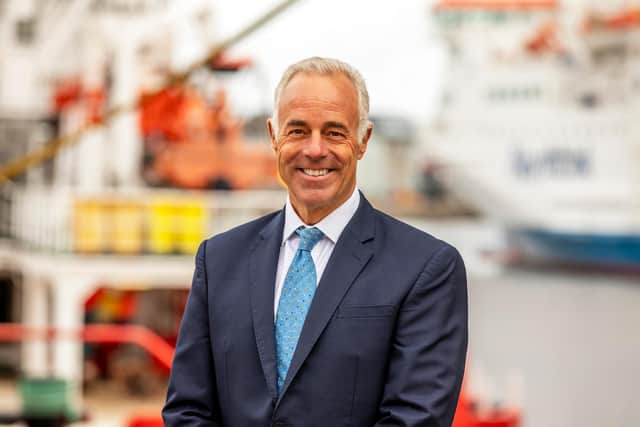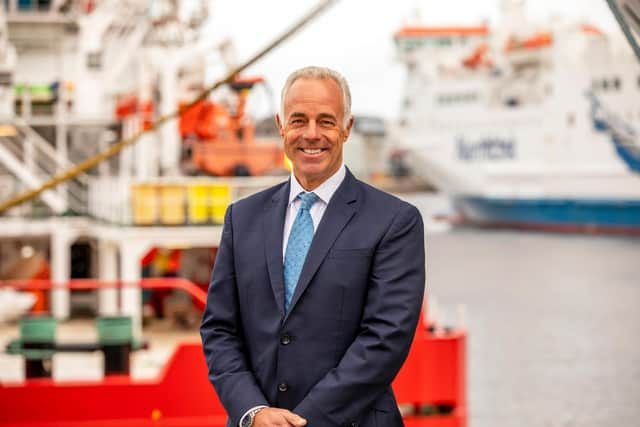The Big Interview: Aberdeen Harbour Board CEO Bob Sanguinetti
Landmarks in its history include in 1909 seeing magician and escapologist Harry Houdini wowing a crowd of thousands with a daring escape after diving into the chilly water whilst chained and handcuffed. “Needless to say, his exploits ensured that his shows at the nearby Palace Theatre in Bridge Place were a huge success,” the Harbour says.
It says it is now Europe’s premier marine support centre for the energy industry and the main commercial port servicing North-east Scotland, handling more than 26 million tonnes of shipping and contributing £1.5 billion to the region’s economy each year.
Advertisement
Hide AdAdvertisement
Hide AdMr Sanguinetti, who was born and raised in Gibraltar, took the tiller in September after his appointment was announced in March, when he had said: “Over these last few years I have watched the Harbour go from strength to strength, making significant investments in its infrastructure – namely the £350 million South Harbour development – which will take the port’s capabilities to an elevated level.


“Aberdeen is already one of the UK’s busiest ports. The expansion will see it play a vital role in the nation’s economic, energy and net-zero ambitions."
After graduating from the University of Oxford, he served in the Royal Navy for almost three decades, rising to the rank of Commodore, before working at the Ministry of Defence in a number of strategic roles.
This was followed by becoming CEO of the Gibraltar Port Authority in 2014, then the same role at the UK Chamber of Shipping in 2018, while he can also lay claim to being a Freeman of the City of London and a Liveryman of the Worshipful Company of Shipwrights, for example.
You have just taken the helm as CEO of Aberdeen Harbour – and have already undertaken a lot of high-profile activity in the role. Can you explain what led you to take up the post, at what is such a historic organisation, and what you aim to achieve?


Aberdeen Harbour is one of the busiest multi-faceted ports in the UK, and our £350m expansion project – the largest marine infrastructure project in the country – will take our capabilities to a new level. Aberdeen Harbour will soon be playing a pivotal role in the UK’s net-zero plans.
We will continue to support our existing customers and partners as they transition from traditional oil and gas activity to increasingly carbon-friendly production, while becoming a port and logistics hub for complex, large-scale projects in the renewable energy sector.
This, together with strong relationships across the private and public sectors, and underpinned by 50 years of experience, skills, innovation and a highly capable supply chain makes Aberdeen Harbour a very exciting place indeed.
Advertisement
Hide AdAdvertisement
Hide AdYour arrival has been described as coming at a “pivotal” time for the harbour, and you are overseeing its expansion. To what extent will that boost operations and the ability to be a key player in the UK’s energy transition, for example having the capacity to serve larger vessels used in the growing offshore wind industry.
Our South Harbour expansion will increase our quayside capacity by more than a fifth and treble the number of deep-water berths at exactly the time when the development of next-generation wind farms and the decommissioning of existing oil and gas platforms will require the use of larger vessels.
Designed to deliver the fuels of the future, the new harbour will single out Aberdeen as one of the first green ports in Scotland. The expansion will also attract light manufacturing capabilities and inward investment opportunities, which will be revolutionary for the Scottish economy.
To what extent can Aberdeen Harbour help Scotland meet its net-zero ambitions, and can you give details of the sustainability of its own activity (e.g. the introduction of shore power at the current port)?
Aberdeen Harbour will play a key role in helping the UK’s maritime and logistics industry address its carbon impact on the marine environment by providing the infrastructure to reduce marine emissions.
In partnership with Connected Places Catapult, we have secured £400,000 of funding from the Department for Transport (DfT) to undertake detailed studies to deliver a significant demonstrator shorepower project, which will reduce emissions from vessels berthed in the port by 50 per cent.
We have also signed the DfT’s Operation Zero initiative to accelerate the decarbonisation of North Sea operations and maintenance vessels by 2025. We are in the process of replacing existing machinery with green alternatives, using electric vehicles throughout the port, and more energy-efficient solutions within the Harbour’s property estate – our power is sourced from sustainable resources, including solar, wind and hydrogen power.
Do you believe ports get enough recognition for their contribution to the economy – and society?
Advertisement
Hide AdAdvertisement
Hide AdBrexit and Covid-19 have highlighted the importance of shipping to the nation’s economy, and to our everyday lives. We mustn’t forget that 95 per cent of the UK’s trade comes to us by sea, and in Scotland, ports handle 71 million tonnes of cargo each year, generating £1.9bn gross value added (GVA) to Scottish gross domestic product – which is actually the highest GVA contribution to our economy.
The role ports play should never be underestimated, and Aberdeen’s as a key energy hub and a lifeline ferry port for the Northern Islands is of critical national importance. This is a responsibility that we take very seriously in all that we do.
Aberdeen Harbour has been highly active during COP26, for example welcoming US Secretary of the Interior Deb Haaland, and attending the event’s International Maritime Hub. Can you explain more about your involvement in the event, and what you hope/feel COP26 will ultimately achieve?
COP26 reminded us that the time for talking is over, and the time for acting is now. We were pleased to be able to attend several events in Glasgow during the fortnight and share with many organisations and individuals our Green Port Strategy, while also hosting visits at our South Harbour expansion site.
The scale of our investment was seen as a clear commitment to energy transition and will be felt at a national level, providing significant economic and environmental benefits for years to come.
Trade body Maritime UK’s work around mental health in the sector has been given the support of Aberdeen Harbour – what prompted your involvement?
Aberdeen Harbour employs just under 100 people, and our teams are very tightly knit. We face challenges on a daily basis and the port remained open for business throughout the entire pandemic.
Maintaining the mental wellbeing of our employees is vital if we are to deliver a continuous, safe and professional service to our many customers. We will provide whatever support is needed to maintain and improve the mental health of our staff, and Maritime UK’s initiatives in this critical area have been very helpful.
Advertisement
Hide AdAdvertisement
Hide AdHow did your previous roles prepare you for your current leadership position?
My role at the UK Chamber of Shipping focused on highlighting the importance of shipping to policy-makers and to the public, so the industry could prosper and support economic growth through free-flowing trade. In Gibraltar, I helped consolidate the port’s role as a key maritime hub to the Mediterranean by improving the services it provides to visiting ships.
The highlights in my naval career were undoubtedly my ship commands. The common thread is the importance of teamwork in getting the best results for your organisation. The same applies in my current role: everyone at Aberdeen Harbour needs to understand what our vision for the future is, and how their individual contributions will make a difference, not just to the port, but to the success of related industries in the region.
The South Harbour is expected to be operational next year. Where do you see challenges – for example related to the pandemic/Brexit/the cost of materials and sourcing staff – and on the flipside what is your best-case scenario for between now and then? What about a few years down the line?
Work is progressing very quickly towards declaring the South Harbour expansion operational in late 2022. Like others, we are facing price increases in concrete and steel, as well as pressures across the construction workforce. We are confident we will overcome these and look forward to welcoming the first ships into the new harbour as planned.
Being so close to completion means we have some advantage on competing port projects that are only emerging from Covid. Continued government support will be welcome, particularly in relation to the effects of Brexit, to ensure we cross the finishing line on time.
In the longer term, we expect to see a high demand for the 1,400 metres of quayside and adjacent land for the construction, operation and maintenance of offshore windfarms and other port-related activities.
A message from the Editor:
Thank you for reading this article. We're more reliant on your support than ever as the shift in consumer habits brought about by coronavirus impacts our advertisers.
If you haven't already, please consider supporting our trusted, fact-checked journalism by taking out a digital subscription.
Comments
Want to join the conversation? Please or to comment on this article.
